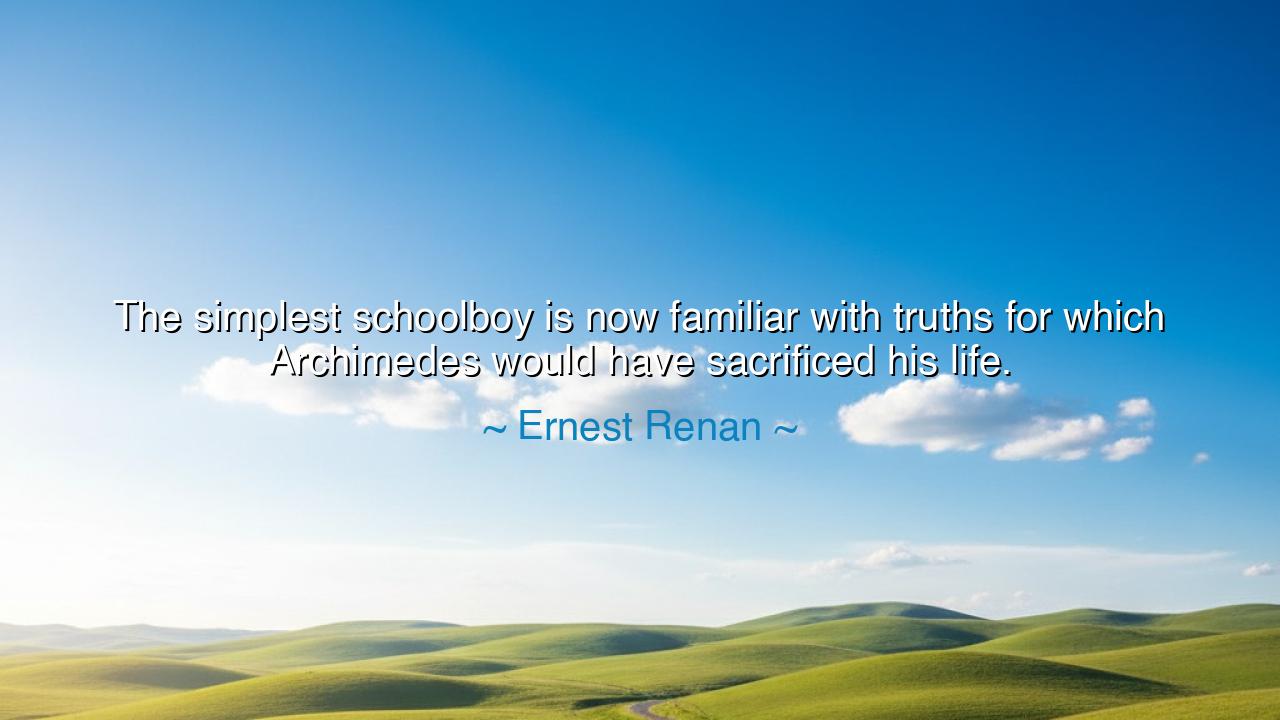
The simplest schoolboy is now familiar with truths for which
The simplest schoolboy is now familiar with truths for which Archimedes would have sacrificed his life.






In the reflective and awe-filled words of Ernest Renan, “The simplest schoolboy is now familiar with truths for which Archimedes would have sacrificed his life.” These words, though serene in tone, carry the weight of ages — a meditation on the endless unfolding of knowledge, the humility of progress, and the sacred duty of learning. Renan, the philosopher and historian, wrote this not in arrogance but in wonder — marveling at the vast reach of human understanding. He saw that the truths which once required genius and courage to discover have now become the common inheritance of children. Yet, in this observation lies both glory and warning: that knowledge may increase, but wisdom must not be lost.
The origin of this quote emerges from the 19th century, an era of immense scientific transformation. Ernest Renan, a scholar of history, language, and philosophy, lived in the age of reason — a time when science was unveiling the secrets of nature that once belonged only to myth and dream. He compared his age to that of Archimedes, the ancient Greek mathematician who lived two millennia before him. Archimedes, the master of geometry and invention, who cried “Eureka!” when he discovered the law of buoyancy, lived in a world that revered the intellect but still chained it within the limits of mystery and superstition. He studied by the flickering light of oil lamps, without the instruments, telescopes, or numbers we now take for granted. And yet, from his own mind, he carved the foundations of modern science.
Renan looked upon this contrast and saw the miracle of time: that the simplest schoolboy — a child just beginning to learn — already possesses, through centuries of accumulated thought, the fruits of Archimedes’s greatest struggles. The boy can understand gravity, the motion of planets, the measurement of circles, the balance of levers — truths that once burned like holy fire in the minds of ancient sages. What Archimedes once reached for through the peril of thought, the child now holds in a textbook. But this was not meant to belittle the child’s knowledge, nor to diminish Archimedes’s genius. Rather, it was to remind us of the continuum of learning, that every mind is heir to the labor of those who came before.
Consider, then, the image of Archimedes himself, hunched over the sand, drawing circles as the Roman soldier approached. When told to rise, he refused, lost in the ecstasy of thought, murmuring, “Do not disturb my circles.” For him, mathematics was more than calculation — it was communion with truth. He would indeed have sacrificed his life for the knowledge he sought, and legend tells us that he did. Yet what once demanded the devotion of a lifetime now sits quietly in a classroom, printed in ink, spoken in casual lessons. Renan’s words therefore carry both triumph and melancholy — triumph, because humanity has advanced so far; melancholy, because we so often forget the cost of progress, the lives of those who labored and suffered to deliver these truths into our hands.
This is the paradox of civilization: as knowledge becomes easier to obtain, it becomes easier to take for granted. The schoolboy, who recites the laws of motion or the theorem of the circle, may not feel the reverence that Archimedes felt for the same truths. The danger lies not in learning too much, but in forgetting the sacredness of learning itself. Renan’s words are a call to gratitude — to remember that every formula, every discovery, is built upon generations of struggle, sacrifice, and vision. For knowledge is not a possession; it is a gift passed from one age to the next, and each generation must earn it anew through respect and wonder.
Throughout history, we see this pattern repeated. Galileo, imprisoned for defending the motion of the Earth; Newton, who spent sleepless nights unraveling the laws of gravity; Curie, who gave her health to study radiation. All of them lived as Archimedes did — driven by a fire for truth, a love of discovery so great that they bore its suffering gladly. And now, the children of our age, armed with computers and telescopes, inherit the universe they revealed. This, then, is the true meaning of Renan’s words: that we stand on the shoulders of giants, and yet often forget to look down in reverence at the strength of those who lift us.
The lesson is clear, noble, and eternal: cherish the gift of knowledge, and do not let familiarity breed contempt for wonder. To learn is not a chore, but an act of remembrance — an honoring of all who came before. Let every student remember that the symbols they scribble upon paper were once carved in dust by the hands of men who defied ignorance and fate. Let every teacher speak not as a dispenser of facts, but as a guardian of a sacred fire. And let every seeker of truth, young or old, study not for pride, but for gratitude — for they hold in their minds the dreams of the ancients.
So let the words of Ernest Renan echo across the centuries: “The simplest schoolboy is now familiar with truths for which Archimedes would have sacrificed his life.” These are not words of arrogance, but of reverence. They remind us that knowledge grows only through the devotion of generations, that learning is both inheritance and responsibility. The child who knows what once was mystery must not only repeat it — he must honor it. For the progress of humankind is not measured in what we know, but in how deeply we remember the cost of knowing.






AAdministratorAdministrator
Welcome, honored guests. Please leave a comment, we will respond soon